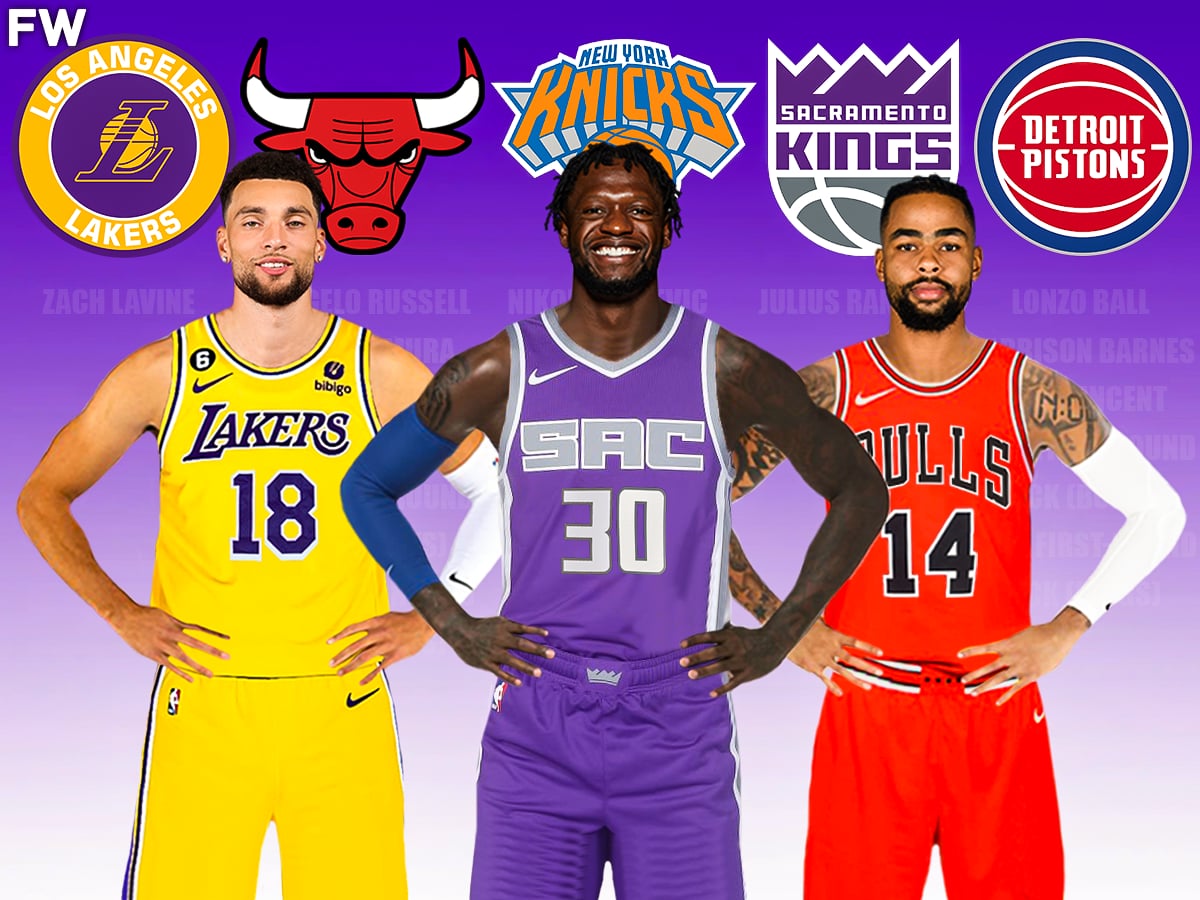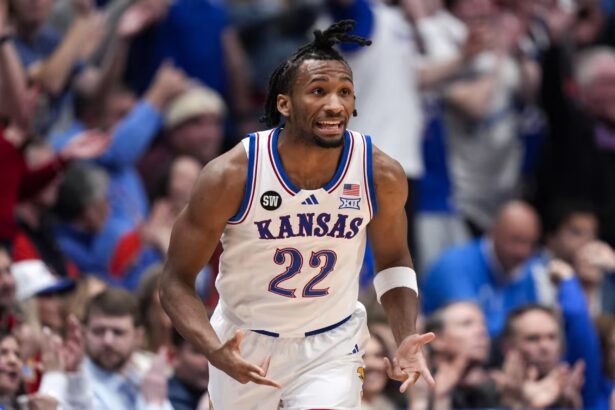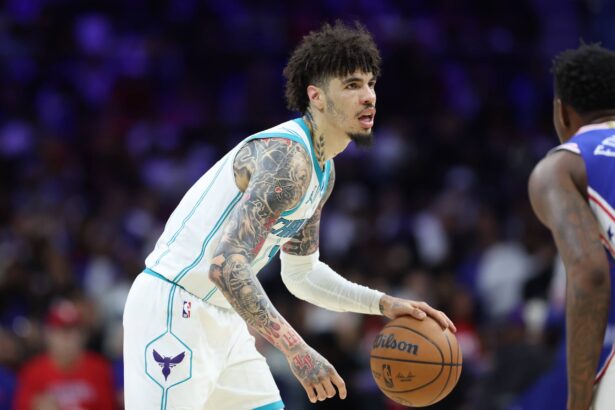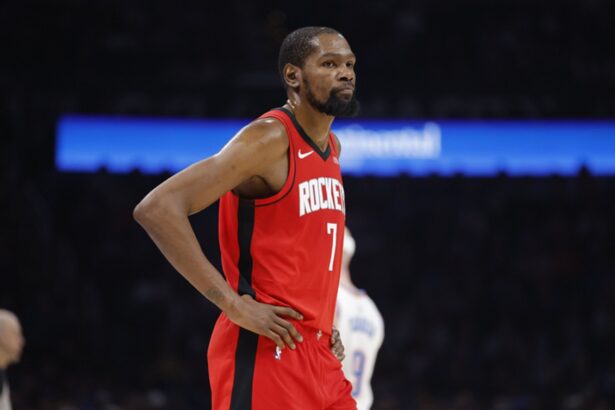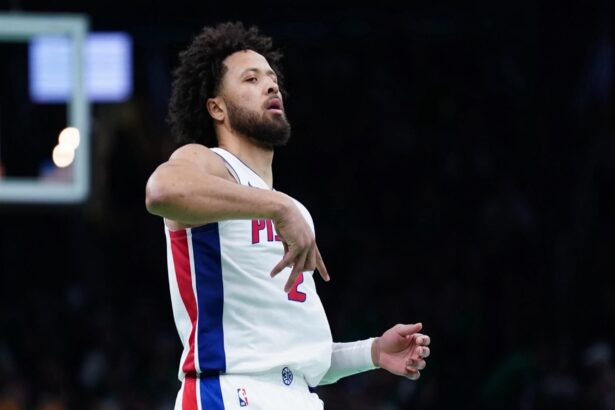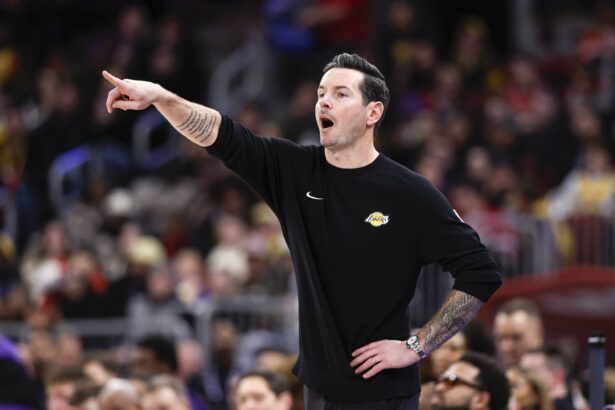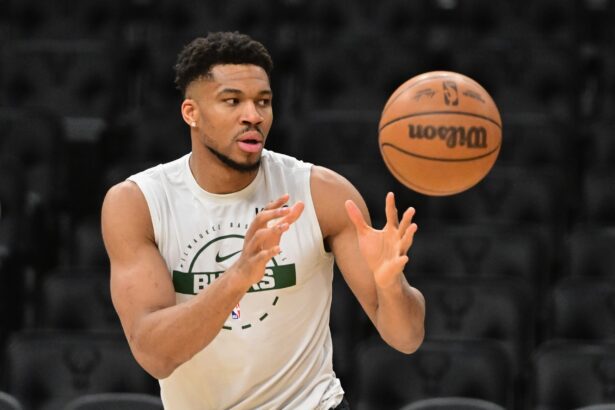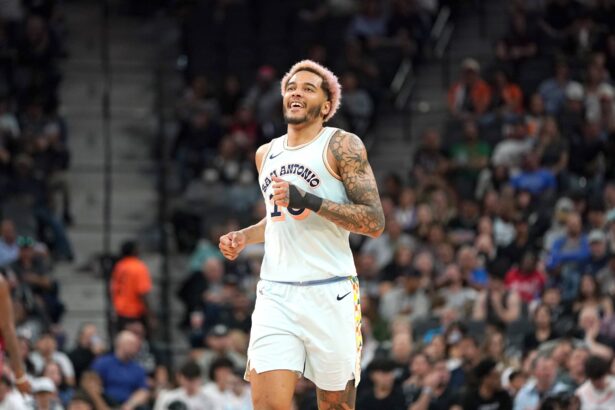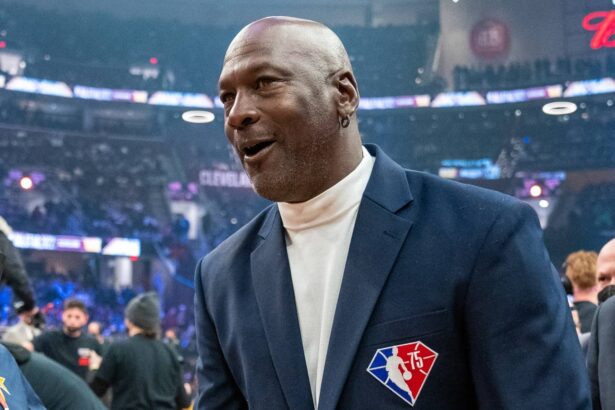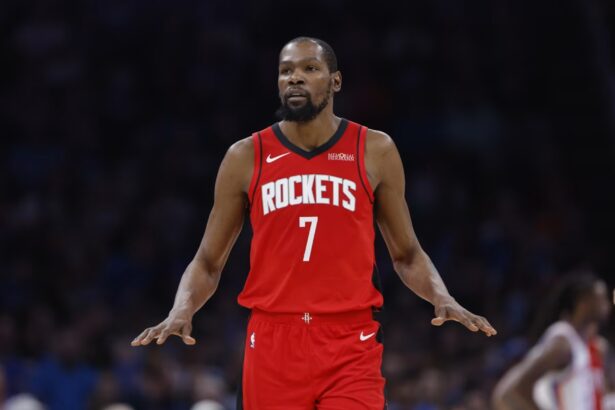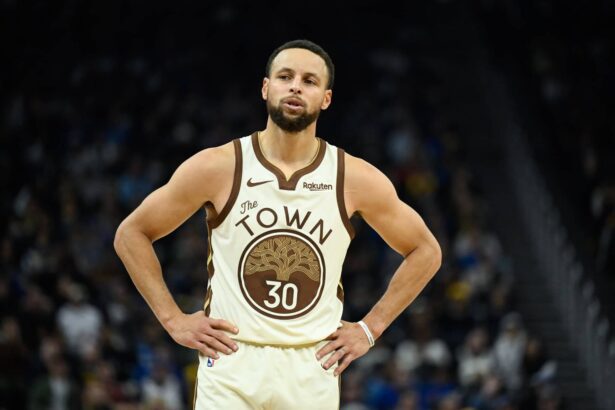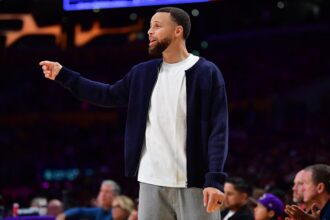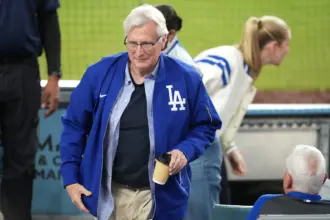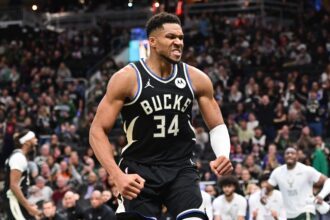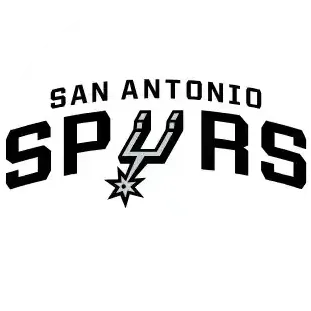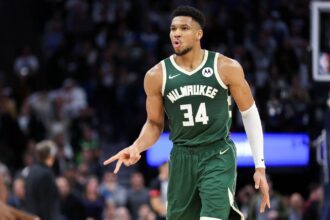In a hypothetical scenario that could reshape the competitive landscape of the NBA, a five-team blockbuster trade involving the Los Angeles Lakers, Chicago Bulls, New York Knicks, Sacramento Kings, and Detroit Pistons is proposed. This imaginative setup, conceptualized to explore the potential impacts of major roster shifts, envisions a trade that could significantly alter team dynamics and strategic directions across the league.
Trade Details
Los Angeles Lakers receive: Zach LaVine
Chicago Bulls receive: D’Angelo Russell, Rui Hachimura, Davion Mitchell, James Wiseman, 2024 No. 25 draft pick (via Knicks), 2029 first-round pick (Lakers)
New York Knicks receive: Nikola Vucevic, Alex Caruso
Sacramento Kings receive: Julius Randle
Detroit Pistons receive: Lonzo Ball, Harrison Barnes, Gabe Vincent, 2024 No. 11 overall pick (via Bulls), 2026 first-round pick (Kings)
The Lakers Get A Third Star This Offseason
The Los Angeles Lakers are poised to shake things up this offseason following a disappointing playoff exit at the hands of the Denver Nuggets. The team’s performance underscored the pressing need to restructure, especially in terms of boosting their offensive capabilities, which have been lacking despite the stellar presence of LeBron James and Anthony Davis. The Lakers’ season concluded with a 47-35 record, and although they made the playoffs, their early exit highlighted significant gaps in their roster composition.
Enter Zach LaVine, an electrifying scorer, whom the Lakers aim to bring on board to address their offensive woes. Last season, LaVine averaged 19.5 points per game on 45.3% shooting from the field and a respectable 34.9% from beyond the arc. His ability to shoot from deep and create his own shots is seen as a perfect complement to the playmaking prowess of LeBron James and the dominant inside presence of Anthony Davis.
However, acquiring LaVine comes at a significant cost. The Lakers are parting ways with D’Angelo Russell, Rui Hachimura, and a future first-round pick. Russell, who returned to the Lakers lineup last season, contributed with 18.0 points and 6.3 assists per game, proving to be a valuable offensive asset. Rui Hachimura, although not always consistent, showed flashes of brilliance and contributed significantly during key stretches, averaging 13.6 points and 4.3 rebounds per game.
The change also extends to the coaching realm, with Darvin Ham being relieved of his duties. The Lakers’ coaching search is notably leaning towards JJ Redick, a choice that suggests a shift towards a more offensively focused strategy. This move could potentially rejuvenate the team’s tactical approaches, especially in maximizing the capabilities of both new and remaining talents.
Moreover, the personal plot thickens with LeBron’s future, as he decides on his $51.4 million player option. With the Lakers’ attempt to draft his son, Bronny James, there’s an added layer of familial ties that could influence his decision. This draft maneuver could see the creation of the NBA’s first father-son duo, adding both a historic and emotional edge to the Lakers’ narrative this season.
With these strategic moves, the Lakers are not just aiming to improve their roster but are also redefining their team identity around a core that now includes a potent scorer like LaVine. This reinvigorated squad hopes to blend the high basketball IQ of LeBron and Davis with LaVine’s scoring to forge a path back to championship contention.
The Bulls Start Retooling
The Chicago Bulls are initiating a significant restructuring this offseason, focusing on a long-term rebuild rather than immediate contention. This strategy is evident from moves in the trade market, highlighted by the departure of Zach LaVine, Nikola Vucevic, and Alex Caruso. These trades signify a shift towards accumulating young talents and draft picks, setting the stage for a new era in Chicago basketball.
Zach LaVine, who had a productive 2023-24 season until a foot injury sidelined him for the season in January, gets moved to the Los Angeles Lakers. This trade marks a significant shift in the Bulls’ strategy, aiming to leverage LaVine’s high value for future assets.
In exchange for their veterans, the Bulls acquire a substantial return package that includes D’Angelo Russell, Rui Hachimura, Davion Mitchell, and James Wiseman, along with future first-round draft picks for this year (No. 25 from the Knicks) and 2029 (from the Lakers). D’Angelo Russell had a significant impact on the Lakers last season, averaging 18.0 points and 6.3 assists per game, showcasing his ability as both a scorer and a facilitator.
Rui Hachimura added versatility and scoring efficiency to the Lakers, and now to the Bulls, with his last season’s averages of 13.6 points and 4.3 rebounds per game. Davion Mitchell and James Wiseman were not big-time players last season, but their inclusion in this trade suggests the Bulls are also investing in defensive potential and interior presence, respectively. Mitchell is known for his tenacity on defense, and Wiseman has shown flashes of promise as a shot-blocker and rebounder in his previous seasons.
This pivotal offseason also revolves around the decision concerning DeMar DeRozan, who is approaching free agency. The Bulls might consider a sign-and-trade to further enhance their rebuilding assets or allow him to leave to manage their salary cap strategically.
Through these trades, the Bulls are clearly signaling a shift towards a rebuild, prioritizing future flexibility and the development of young players. This approach could reshape the franchise’s trajectory, aiming for sustained success in the years to come.
Another Big-Time Move In New York
The New York Knicks are poised to make significant strides this offseason after achieving a strong second-seed finish in the Eastern Conference and making a deep playoff run so far. Their strategy focuses on solidifying their roster with key acquisitions, particularly to bolster their frontcourt and backcourt depth due to injuries and performance in the playoffs.
Nikola Vucevic, joining from the Chicago Bulls, brings impressive credentials to the Knicks. In the 2023-2024 season, Vucevic played 76 games, starting in 74 of them, and averaged 18.0 points and 10.5 rebounds per game, with a shooting efficiency of 48.4% from the field. His ability to stretch the floor is evident in his 29.4% shooting from beyond the arc. Vucevic’s presence could provide a robust scoring option next to Jalen Brunson and a solid rebounding force alongside Isaiah Hartenstein, who will likely continue in a significant role.
Alex Caruso, known for his defensive prowess, also joins the Knicks, further strengthening their guard rotation with his 10.1 points, 3.8 rebounds, and 3.5 assists. His inclusion could significantly enhance New York’s defensive capabilities, complementing the existing backcourt setup featuring Josh Hart and Donte DiVincenzo.
This strategic pivot comes at a cost, with Julius Randle being part of the outgoing trade package. Randle’s absence, especially after missing the playoffs due to injury, might impact the team’s dynamics, but Vucevic’s versatile play as both a center and power forward offers substantial compensation.
Overall, these moves by the Knicks signal a robust attempt to build on their recent success by adding depth and versatility to their lineup, aiming for an even stronger performance in the upcoming seasons. This approach not only addresses immediate needs but also sets up the team for future resilience in the competitive Eastern Conference landscape.
The Kings Get Some Extra Help
The Sacramento Kings have made some strategic moves to strengthen their roster, aiming to build on their playoff appearance from the previous season. After finishing as the 9th seed in the Western Conference with a record of 46-36, the Kings are focused on improving and solidifying their team dynamics for better performance in the upcoming season.
Key players like De’Aaron Fox and Domantas Sabonis have been instrumental, with Fox leading the team in scoring at 26.6 points per game and Sabonis dominating the boards with 13.7 rebounds per game. Their contributions have been central to the team’s strategy, particularly in facilitating the offense and controlling the game’s pace.
The addition of Julius Randle from the Knicks in exchange for assets including Davion Mitchell, Harrison Barnes, and a future pick adds depth and versatility to the Kings’ frontcourt. Randle, who missed the playoffs due to injury, will look to bounce back and contribute significantly alongside Sabonis, potentially providing the Kings with a robust scoring and rebounding presence after averaging 24.0 points, 9.2 rebounds, and 5.0 assists this season. This move aims to solidify the Kings’ position as a competitive force in the Western Conference, particularly by enhancing their interior play and overall team depth.
By focusing on both maintaining core players and strategically adding new talents, the Kings are positioning themselves for a potentially deeper playoff run, reflecting an optimistic outlook for their performance in the upcoming season.
The Pistons Keep Getting Assets
The Detroit Pistons are strategically positioning themselves to enhance their asset pool by acquiring future draft picks and taking on unfavorable contracts from other teams. This approach aligns with their broader rebuilding efforts, especially after a challenging season where they finished with a 14-68 record, marking the worst in the NBA for the 2023-24 season.
In a notable move, the Pistons have decided to accept the contracts of Harrison Barnes, Lonzo Ball, and Gabe Vincent. This decision allows them to accumulate additional future first-round picks with a Lottery Pick included (2024 No. 11 overall pick via Bulls), a strategy that provides them with more flexibility and potential assets for upcoming drafts or further trades.
The inclusion of Barnes adds an experienced forward who can contribute both offensively and defensively, while Ball offers playmaking skills if healthy and Vincent adds depth at the guard position. This influx of players, however, comes with the challenge of managing their contracts, which are considered less favorable due to various factors, including injury history and performance consistency.
Moreover, the Pistons have opted not to renew James Wiseman, potentially due to his injury concerns and fit within the team’s future plans. This move is indicative of the Pistons’ focus on financial flexibility and strategic asset management as they look to navigate out of the bottom of the league standings.
Overall, these moves are part of the Pistons’ ongoing strategy to rebuild through acquiring assets and managing cap space effectively. While it might not translate into immediate success on the court, it sets the groundwork for a more structured and potentially fruitful rebuild in the years to come.
Overall Conclusion
In this 5-team blockbuster trade, several teams make strategic trades aimed at repositioning themselves for future success or capitalizing on immediate opportunities. Each team’s approach reflects its unique circumstances and long-term ambitions.
The Los Angeles Lakers, aiming to bolster their offensive firepower around key players LeBron James and Anthony Davis, acquire Zach LaVine. This move is intended to complement their star duo with additional scoring prowess, thereby enhancing their championship prospects in the near term. The Lakers’ decision underscores their commitment to leveraging James’ remaining years at the peak of his abilities to vie for NBA titles.
Meanwhile, the Chicago Bulls embark on a different path, choosing to reset their roster by trading away established stars like Zach LaVine and Nikola Vucevic. This strategic pivot towards gathering young talent and draft picks suggests a shift in focus from immediate contention to long-term asset accumulation and development. By refreshing their roster, the Bulls are looking to build a foundation that can sustain success in the future, aligning with a broader vision of team building in the NBA.
On the East Coast, the New York Knicks capitalize on their recent playoff success by acquiring Nikola Vucevic and Alex Caruso. These additions are aimed at deepening the team’s playoff capabilities through enhanced scoring and defense. Vucevic brings a reliable interior presence and scoring ability, while Caruso is known for his defensive prowess. Together, they provide the Knicks with the tools to potentially advance further in the playoffs, building on their strong finish as the second seed in the Eastern Conference.
In the Western Conference, the Sacramento Kings strategically add Julius Randle to their roster. This move is designed to complement their dynamic backcourt and strengthen their frontcourt, signaling the Kings’ intentions to make a deeper playoff run. Randle’s versatility and scoring ability could provide the Kings with an additional edge in the competitive landscape of the Western Conference.
Lastly, the Detroit Pistons, amidst a challenging season, focus on asset accumulation and financial flexibility. By accepting less favorable contracts and acquiring future draft picks, they are setting the stage for a comprehensive rebuild after acquiring the No. 5 overall pick in the 2024 NBA Draft.

